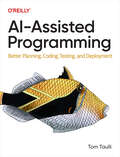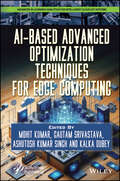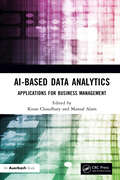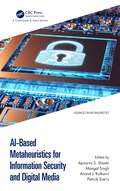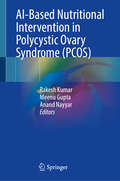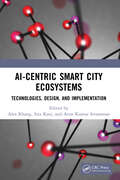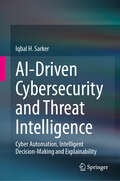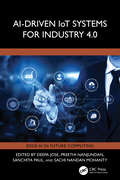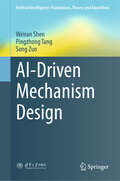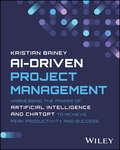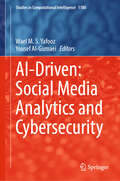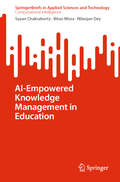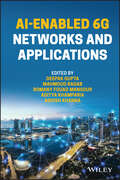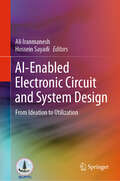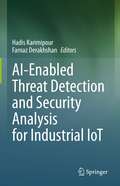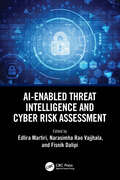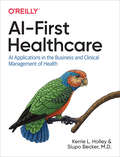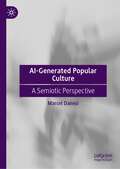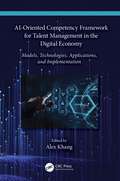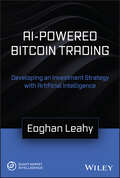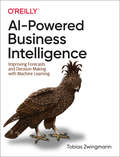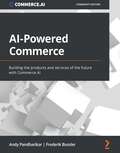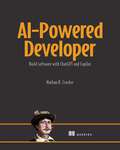- Table View
- List View
AI-Assisted Programming: Better Planning, Coding, Testing, and Deployment
by Tom TaulliGet practical advice on how to leverage AI development tools for all stages of code creation, including requirements, planning, design, coding, debugging, testing, and documentation. With this book, beginners and experienced developers alike will learn how to use a wide range of tools, from general-purpose LLMs (ChatGPT, Gemini, and Claude) to code-specific systems (GitHub Copilot, Tabnine, Cursor, and Amazon CodeWhisperer).You'll also learn about more specialized generative AI tools for tasks such as text-to-image creation.Author Tom Taulli provides a methodology for modular programming that aligns effectively with the way prompts create AI-generated code. This guide also describes the best ways of using general purpose LLMs to learn a programming language, explain code, or convert code from one language to another.This book examines:The core capabilities of AI-based development toolsPros, cons, and use cases of popular systems such as GitHub Copilot and Amazon CodeWhispererWays to use ChatGPT, Gemini, Claude, and other generic LLMs for codingUsing AI development tools for the software development lifecycle, including requirements, planning, coding, debugging, and testingPrompt engineering for developmentUsing AI-assisted programming for tedious tasks like creating regular expressions, starter code, object-oriented programming classes, and GitHub ActionsHow to use AI-based low-code and no-code tools, such as to create professional UIs
AI-Based Advanced Optimization Techniques for Edge Computing
by Ashutosh Kumar Singh Mohit Kumar Gautam Srivastava Kalka DubeyThe book offers cutting-edge insights into AI-driven optimization algorithms and their crucial role in enhancing real-time applications within fog and Edge IoT networks and addresses current challenges and future opportunities in this rapidly evolving field. This book focuses on artificial intelligence-induced adaptive optimization algorithms in fog and Edge IoT networks. Artificial intelligence, fog, and edge computing, together with IoT, are the next generation of paradigms offering services to people to improve existing services for real-time applications. Over the past few years, there has been rigorous growth in AI-based optimization algorithms and Edge and IoT paradigms. However, despite several applications and advancements, there are still some limitations and challenges to address including security, adaptive, complex, and heterogeneous IoT networks, protocols, intelligent offloading decisions, latency, energy consumption, service allocation, and network lifetime. This volume aims to encourage industry professionals to initiate a set of architectural strategies to solve open research computation challenges. The authors achieve this by defining and exploring emerging trends in advanced optimization algorithms, AI techniques, and fog and Edge technologies for IoT applications. Solutions are also proposed to reduce the latency of real-time applications and improve other quality of service parameters using adaptive optimization algorithms in fog and Edge paradigms. The book provides information on the full potential of IoT-based intelligent computing paradigms for the development of suitable conceptual and technological solutions using adaptive optimization techniques when faced with challenges. Additionally, it presents in-depth discussions in emerging interdisciplinary themes and applications reflecting the advancements in optimization algorithms and their usage in computing paradigms. Audience Researchers, industrial engineers, and graduate/post-graduate students in software engineering, computer science, electronic and electrical engineering, data analysts, and security professionals working in the fields of intelligent computing paradigms and similar areas.
AI-Based Data Analytics: Applications for Business Management
by Mansaf Alam Kiran ChaudharyThis book covers various topics related to marketing and business analytics. It explores how organizations can increase their profits by making better decisions in a timely manner through the use of data analytics. This book is meant for students, practitioners, industry professionals, researchers, and academics working in the field of commerce and marketing, big data analytics, and organizational decision-making. Highlights of the book include: The role of Explainable AI in improving customer experiences in e-commerce Sentiment analysis of social media Data analytics in business intelligence Federated learning for business intelligence AI-based planning of business management An AI-based business model innovation in new technologies An analysis of social media marketing and online impulse buying behaviour AI-Based Data Analytics: Applications for Business Management has two primary focuses. The first is on analytics for decision-making and covers big data analytics for market intelligence, data analytics and consumer behavior, and the role of big data analytics in organizational decision-making. The book’s second focus is on digital marketing and includes the prediction of marketing by consumer analytics, web analytics for digital marketing, smart retailing, and leveraging web analytics for optimizing digital marketing strategies.
AI-Based Metaheuristics for Information Security and Digital Media (Advances in Metaheuristics)
by Patrick Siarry Anand J. Kulkarni Apoorva S. Shastri Mangal SinghThis book examines the latest developments in Artificial Intelligence (AI)-based metaheuristics algorithms with applications in information security for digital media. It highlights the importance of several security parameters, their analysis, and validations for different practical applications. Drawing on multidisciplinary research including computer vision, machine learning, artificial intelligence, and modified/newly developed metaheuristics algorithms, it will enhance information security for society. It includes state-of-the-art research with illustrations and exercises throughout.
AI-Based Nutritional Intervention in Polycystic Ovary Syndrome (PCOS)
by Rakesh Kumar Anand Nayyar Meenu GuptaThis book provides an overview of AI-powered nutritional interventions for the management of Polycystic Ovary Syndrome (PCOS). It focuses on AI-driven diagnostics for swift and accurate PCOS identification, personalized nutrition plans integrating genetic and hormonal data, and behavioral interventions promoting adherence. The book bridges the gap between technological innovation and clinical practice, leading to a new era of precision medicine in women's health. Chapters cover information from AI-tailored nutrition plans to suit individual PCOS profiles to insights into micronutrients, macronutrients, and dietary choices. They also address glycemic control, hormonal balance, and holistic wellness. Further chapters cover the ethical dimensions of AI in healthcare while championing patient empowerment. It also provides real-time monitoring through wearable tech and ethical considerations surrounding AI implementation in healthcare. The book includes real-life success stories, case studies, and practical guidance to aid decision-making. The book is relevant for healthcare professionals, gynecologists, nutritionists, and researchers to harness artificial intelligence’s potential in optimizing women's health and well-being.
AI-Centric Smart City Ecosystems: Technologies, Design and Implementation
by Alex Khang Sita Rani Arun Kumar SivaramanOver the next few years, smart city technologies will be rolled out, and the IoT devices and AI-centric systems will provide even more far-reaching connectivity. This book presents various concepts in the design and development of a smart city and methodologies and solutions involved in designing contemporary infrastructure for building smart cities around the world. The book will focus mainly on six areas of smart city infrastructures: smart city entities, IoT-based solutions, AI-centric control systems, smart systems, cybersecurity mechanisms, data science, and cloud computing for the deployment of the smart ecosystem. AI-Centric Smart City Ecosystem: Technologies, Design, and Implementation will discuss the role of AI-centric innovative systems and beyond intelligent solutions in the smart city framework. Readers will discover how to apply design principles and technologies for operating intelligent cities and develop an understanding of how to integrate AI-based control systems to make systems smarter. The book will present various concepts in the design and development of smart cities and methodologies and solutions involved in designing modern infrastructure. Also, readers can discover how to develop applications and connect the IoT devices for collecting and mining real-time data and uncover the challenges and techniques for improving the automatic operation in the smart city by using high-tech solutions. This book is intended to serve the needs of the industry, engineers, professionals, researchers, and master’s and doctoral students studying emerging technologies in smart city ecosystems.
AI-Driven Cybersecurity and Threat Intelligence: Cyber Automation, Intelligent Decision-Making and Explainability
by Iqbal H. SarkerThis book explores the dynamics of how AI (Artificial Intelligence) technology intersects with cybersecurity challenges and threat intelligence as they evolve. Integrating AI into cybersecurity not only offers enhanced defense mechanisms, but this book introduces a paradigm shift illustrating how one conceptualize, detect and mitigate cyber threats. An in-depth exploration of AI-driven solutions is presented, including machine learning algorithms, data science modeling, generative AI modeling, threat intelligence frameworks and Explainable AI (XAI) models. As a roadmap or comprehensive guide to leveraging AI/XAI to defend digital ecosystems against evolving cyber threats, this book provides insights, modeling, real-world applications and research issues. Throughout this journey, the authors discover innovation, challenges, and opportunities. It provides a holistic perspective on the transformative role of AI in securing the digital world.Overall, the useof AI can transform the way one detects, responds and defends against threats, by enabling proactive threat detection, rapid response and adaptive defense mechanisms. AI-driven cybersecurity systems excel at analyzing vast datasets rapidly, identifying patterns that indicate malicious activities, detecting threats in real time as well as conducting predictive analytics for proactive solution. Moreover, AI enhances the ability to detect anomalies, predict potential threats, and respond swiftly, preventing risks from escalated. As cyber threats become increasingly diverse and relentless, incorporating AI/XAI into cybersecurity is not just a choice, but a necessity for improving resilience and staying ahead of ever-changing threats. This book targets advanced-level students in computer science as a secondary textbook. Researchers and industry professionals working in various areas, such as Cyber AI, Explainable and Responsible AI, Human-AI Collaboration, Automation and Intelligent Systems, Adaptive and Robust Security Systems, Cybersecurity Data Science and Data-Driven Decision Making will also find this book useful as reference book.
AI-Driven IoT Systems for Industry 4.0 (ISSN)
by Sachi Nandan Mohanty Preethi Nanjundan Deepa Jose Sanchita PaulThe purpose of this book is to discuss the trends and key drivers of Internet of Things (IoT) and artificial intelligence (AI) for automation in Industry 4.0. IoT and AI are transforming the industry thus accelerating efficiency and forging a more reliable automated enterprise. AI-driven IoT systems for Industry 4.0 explore current research to be carried out in the cutting-edge areas of AI for advanced analytics, integration of industrial IoT (IIoT) solutions and Edge components, automation in cyber-physical systems, world leading Industry 4.0 frameworks and adaptive supply chains, etc.A thorough exploration of Industry 4.0 is provided, focusing on the challenges of digital transformation and automation. It covers digital connectivity, sensors, and the integration of intelligent thinking and data science. Emphasizing the significance of AI, the chapter delves into optimal decision-making in Industry 4.0. It extensively examines automation and hybrid edge computing architecture, highlighting their applications. The narrative then shifts to IIoT and edge AI, exploring their convergence and the use of edge AI for visual insights in smart factories. The book concludes by discussing the role of AI in constructing digital twins, speeding up product development lifecycles, and offering insights for decision-making in smart factories. Throughout, the emphasis remains on the transformative impact of deep learning and AI in automating and accelerating manufacturing processes within the context of Industry 4.0.This book is intended for undergraduates, postgraduates, academicians, researchers, and industry professionals in industrial and computer engineering.
AI-Driven Mechanism Design (Artificial Intelligence: Foundations, Theory, and Algorithms)
by Weiran Shen Pingzhong Tang Song ZuoDue to its huge success in industry, mechanism design has been one of the central research topics at the interface of economics and computer science. However, despite decades of effort, there are still numerous challenges, in terms of both theory and applications. These include the problem of how to design mechanisms for selling multiple items, dynamic auctions, and balancing multiple objectives, given the huge design space and buyer strategy space; and the fact that in practice, the most widely applied auction format (the generalized second price auction) is neither truthful nor optimal. Furthermore, many theoretical results are based upon unrealistic assumptions that do not hold in real applications. This book presents the AI-driven mechanism design framework, which aims to provide an alternative way of dealing with these problems. The framework features two abstract models that interact with each other: the agent model and the mechanism model. By combining AI techniques with mechanism design theory, it solves problems that cannot be solved using tools from either domain alone. For example, it can reduce the mechanism space significantly, build more realistic buyer models, and better balance different objectives. The book focuses on several aspects of mechanism design and demonstrates that the framework is useful in both theoretical analysis and practical applications.
AI-Driven Project Management: Harnessing the Power of Artificial Intelligence and ChatGPT to Achieve Peak Productivity and Success
by Kristian BaineyAccelerate your next project with artificial intelligence and ChatGPT In AI-Driven Project Management: Harnessing the Power of Artificial Intelligence and ChatGPT to Achieve Peak Productivity and Success, veteran IT and project management advisor Kristian Bainey delivers an insightful collection of strategies for automating the administration and management of projects. In the book, the author focuses on four key areas where project leaders can achieve improved results with AI's data-centric capabilities: minimizing surprises, minimizing bias, increasing standards, and accelerating decision making. You'll also find: Primers on the role of AI and ChatGPT in Agile, Hybrid, and Predictive approaches to project management How to accurately forecast a project with ChatGPT Techniques for crafting impactful AI strategy using AI project management principles Perfect for managers, executives, and business leaders everywhere, AI-Driven Project Management is also a must-read for project management professionals, tech professionals and enthusiasts, and anyone else interested in the intersection of artificial intelligence, machine learning, and project management.
AI-Driven: Social Media Analytics and Cybersecurity (Studies in Computational Intelligence #1180)
by Wael M. S. Yafooz Yousef Al-GumaeiThis book presents state-of-the-art research, conceptual frameworks, and practical solutions, focusing on the intersection of these vital fields. The ever-evolving digital landscape has fostered a close relationship between social media and cybersecurity. Both social media analytics and cybersecurity are prominent research areas that shape the lives of individuals, organizations, and communities. It covers three key categories: First, social media analytics, which explores how data from platforms like Twitter and Facebook is harnessed for insights, sentiment analysis, and trend predictions. Second, cybersecurity and digital safety, which addresses emerging threats and explores tools and strategies to secure digital spaces. Third, advanced technologies and their broader impacts, which examines the technologies shaping social media platforms. This book is an invaluable resource for researchers, professionals, and students, providing comprehensive insights into the application of advanced technologies and analytical techniques for safeguarding digital environments. It is essential reading for anyone interested in social media analytics, digital safety, and the future of technology.
AI-Empowered Knowledge Management in Education (SpringerBriefs in Applied Sciences and Technology)
by Nilanjan Dey Sayan Chakraborty Bitan MisraThis book explains basic ideas behind several methods used in artificial intelligence-based knowledge management techniques. It also shows how these techniques are applied in practical contexts in different education sectors. The book discusses AI-based knowledge management applications, AI-empowered knowledge management in primary and higher education, and technical and ethical challenges and opportunities.
AI-Enabled 6G Networks and Applications
by Deepak Gupta Ashish Khanna Aditya Khamparia Mahmoud Ragab Romany Fouad MansourAI-ENABLED 6G NETWORKS AND APPLICATIONS Provides authoritative guidance on utilizing AI techniques in 6G network design and optimization Written and edited by active researchers, this book covers hypotheses and practical considerations and provides insights into the design of evolutionary AI algorithms for 6G networks, with focus on network transparency, interpretability and simulatability for vehicular networks, space systems, surveillance systems and their usages in different emerging engineering fields. AI-Enabled 6G Networks and Applications includes a review of AI techniques for 6G Networks and will focus on deployment of AI techniques to efficiently and effectively optimize the network performance, including AI-empowered mobile edge computing, intelligent mobility and handover management, and smart spectrum management. This book includes the design of a set of evolutionary AI hybrid algorithms with communication protocols, showing how to use them in practice to solve problems relating to vehicular networks, aerial networks, and communication networks. Reviews various types of AI techniques such as AI-empowered mobile edge computing, intelligent handover management, and smart spectrum management Describes how AI techniques manage computation efficiency, algorithm robustness, hardware development, and energy management Identifies and provides solutions to problems in current 4G/5G networks and emergent 6G architectures Discusses privacy and security issues in IoT-enabled 6G Networks Examines the use of machine learning to achieve closed-loop optimization and intelligent wireless communication AI-Enabled 6G Networks and Applications is an essential reference guide to advanced hybrid computational intelligence methods for 6G supportive networks and protocols, suitable for graduate students and researchers in network forensics and optimization, computer science, and engineering.
AI-Enabled Electronic Circuit and System Design: From Ideation to Utilization
by Ali Iranmanesh Hossein SayadiAs our world becomes increasingly digital, electronics underpin nearly every industry. Understanding how AI enhances this foundational technology can unlock innovations, from smarter homes to more powerful gadgets, offering vast opportunities for businesses and consumers alike. This book demystifies how AI streamlines the creation of electronic systems, making them smarter and more efficient. With AI&’s transformative impact on various engineering fields, this resource provides an up-to-date exploration of these advancements, authored by experts actively engaged in this dynamic field. Stay ahead in the rapidly evolving landscape of AI in engineering with &“AI-Enabled Electronic Circuit and System Design: From Ideation to Utilization,&” your essential guide to the future of electronic systems. A transformative guide describing how revolutionizes electronic design through AI integration. Highlighting trends, challenges and opportunities; Demystifies complex AI applications in electronic design for practical use; Leading insights, authored by top experts actively engaged in the field; Offers a current, relevant exploration of significant topics in AI&’s role in electronic circuit and system design. Editor&’s bios. Dr. Ali A. Iranmanesh is the founder and CEO of Silicon Valley Polytechnic Institute. He has received his Bachelor of Science in Electrical Engineering from Sharif University of Technology (SUT), Tehran, Iran, and both his master&’s and Ph.D. degrees in Electrical Engineering and Physics from Stanford University in Stanford, CA. He additionally holds a master&’s degree in business administration (MBA) from San Jose State University in San Jose, CA. Dr. Iranmanesh is the founder and chairman of the International Society for Quality Electronic Design (ISQED). Currently, he serves as the CEO of Innovotek. Dr. Iranmanesh has been instrumental in advancing semiconductor technologies, innovative design methodologies, and engineering education. He holds nearly 100 US and international patents, reflecting his signifi cant contributions to the field. Dr. Iranmanesh is the Senior life members of EEE, senior member of the American Society for Quality, co-founder and Chair Emeritus of the IEEE Education Society of Silicon Valley, Vice Chair Emeritus of the IEEE PV chapter, and recipient of IEEE Outstanding Educator Award. Dr. Hossein Sayadi is a Tenure-Track Assistant Professor and Associate Chair in the Department of Computer Engineering and Computer Science at California State University, Long Beach (CSULB). He earned his Ph.D. in Electrical and Computer Engineering from George Mason University in Fairfax, Virginia, and an M.Sc. in Computer Engineering from Sharif University of Technology in Tehran, Iran. As a recognized researcher with over 14 years of research experience, Dr. Sayadi is the founder and director of the Intelligent, Secure, and Energy-Efficient Computing (iSEC) Lab at CSULB. His research focuses on advancing hardware security and trust, AI and machine learning, cybersecurity, and energy-efficient computing, addressing critical challenges in modern computing and cyber-physical systems. He has authored over 75 peer-reviewed publications in leading conferences and journals. Dr. Sayadi is the CSU STEM-NET Faculty Fellow, with his research supported by multiple National Science Foundation (NSF) grants and awards from CSULB and the CSU Chancellor&’s Office. He has contributed to various international conferences as an organizer and program committee member, including as the TPC Chair for the 2024 and 2025 IEEE ISQ
AI-Enabled Threat Detection and Security Analysis for Industrial IoT
by Hadis Karimipour Farnaz DerakhshanThis contributed volume provides the state-of-the-art development on security and privacy for cyber-physical systems (CPS) and industrial Internet of Things (IIoT). More specifically, this book discusses the security challenges in CPS and IIoT systems as well as how Artificial Intelligence (AI) and Machine Learning (ML) can be used to address these challenges. Furthermore, this book proposes various defence strategies, including intelligent cyber-attack and anomaly detection algorithms for different IIoT applications. Each chapter corresponds to an important snapshot including an overview of the opportunities and challenges of realizing the AI in IIoT environments, issues related to data security, privacy and application of blockchain technology in the IIoT environment. This book also examines more advanced and specific topics in AI-based solutions developed for efficient anomaly detection in IIoT environments. Different AI/ML techniques including deep representation learning, Snapshot Ensemble Deep Neural Network (SEDNN), federated learning and multi-stage learning are discussed and analysed as well. Researchers and professionals working in computer security with an emphasis on the scientific foundations and engineering techniques for securing IIoT systems and their underlying computing and communicating systems will find this book useful as a reference. The content of this book will be particularly useful for advanced-level students studying computer science, computer technology, cyber security, and information systems. It also applies to advanced-level students studying electrical engineering and system engineering, who would benefit from the case studies.
AI-Enabled Threat Intelligence and Cyber Risk Assessment
by Narasimha Rao Vajjhala Edlira Martiri Fisnik DalipiAI-Enabled Threat Intelligence and Cyber Risk Assessment delves into the transformative potential of artificial intelligence (AI) in revolutionizing cybersecurity, offering a comprehensive exploration of current trends, challenges, and future possibilities in mitigating cyber risks. This book brings together cutting-edge research and practical insights from an international team of experts to examine how AI technologies are reshaping threat intelligence, safeguarding data, and driving digital transformation across industries. The book covers a broad spectrum of topics, including AI-driven fraud prevention in digital marketing, strategies for building customer trust through data privacy, and the role of AI in enhancing educational and healthcare cybersecurity systems. Through in-depth analyses and case studies, this book highlights the barriers to AI adoption, the legal and ethical considerations, and the development of resilient cybersecurity frameworks.Special emphasis is given to regional insights, such as the digital transformation of Kazakh businesses and the integration of AI in diverse global contexts, offering valuable lessons for researchers, policymakers, and practitioners. From safeguarding patient data in healthcare to addressing automated threats in digital marketing, this book provides actionable strategies and emerging perspectives on the evolving landscape of AI in risk management. Designed for academics, professionals, and students, AI-Enabled Threat Intelligence and Cyber Risk Assessment serves as an essential resource for understanding the intersection of AI, cybersecurity, and risk assessment. With contributions from leading researchers across various disciplines, this book underscores the critical role of AI in building resilient, ethical, and innovative solutions to today’s most pressing cybersecurity challenges.
AI-First Healthcare
by Kerrie L. Holley Siupo BeckerAI is poised to transform every aspect of healthcare, including the way we manage personal health, from customer experience and clinical care to healthcare cost reductions. This practical book is one of the first to describe present and future use cases where AI can help solve pernicious healthcare problems.Kerrie Holley and Siupo Becker provide guidance to help informatics and healthcare leadership create AI strategy and implementation plans for healthcare. With this book, business stakeholders and practitioners will be able to build knowledge, a roadmap, and the confidence to support AIin their organizations—without getting into the weeds of algorithms or open source frameworks.Cowritten by an AI technologist and a medical doctor who leverages AI to solve healthcare’s most difficult challenges, this book covers:The myths and realities of AI, now and in the futureHuman-centered AI: what it is and how to make it possibleUsing various AI technologies to go beyond precision medicineHow to deliver patient care using the IoT and ambient computing with AIHow AI can help reduce waste in healthcareAI strategy and how to identify high-priority AI application
AI-Generated Popular Culture: A Semiotic Perspective
by Marcel DanesiThis book gives a general overview of Artificial Intelligence as it is impacting on the world of the arts and culture. What is AI-generated pop culture? What does a movie, a musical work, a novel, or song created entirely by a generative AI imply in terms of our notions of creativity? What is the semiotic dynamic (the meaning-making impulse that humans imprint in sign and textual forms) that is involved in an AI-produced work? No comprehensive treatment exists of the profound implications that AI-generated pop culture entails, including how it might affect cultural evolution and how we interpret artistic artifacts. Such a treatment is critical at this moment, and this book aims to fill this gap.
AI-ML for Decision and Risk Analysis: Challenges and Opportunities for Normative Decision Theory (International Series in Operations Research & Management Science #345)
by Louis Anthony Cox Jr.This book explains and illustrates recent developments and advances in decision-making and risk analysis. It demonstrates how artificial intelligence (AI) and machine learning (ML) have not only benefitted from classical decision analysis concepts such as expected utility maximization but have also contributed to making normative decision theory more useful by forcing it to confront realistic complexities. These include skill acquisition, uncertain and time-consuming implementation of intended actions, open-world uncertainties about what might happen next and what consequences actions can have, and learning to cope effectively with uncertain and changing environments. The result is a more robust and implementable technology for AI/ML-assisted decision-making.The book is intended to inform a wide audience in related applied areas and to provide a fun and stimulating resource for students, researchers, and academics in data science and AI-ML, decision analysis, and other closely linked academic fields. It will also appeal to managers, analysts, decision-makers, and policymakers in financial, health and safety, environmental, business, engineering, and security risk management.
AI-Oriented Competency Framework for Talent Management in the Digital Economy: Models, Technologies, Applications, and Implementation
by Alex KhangIn the digital-driven economy era, an AI-oriented competency framework (AIoCF) is a collection to identify AI-oriented knowledge, attributes, efforts, skills, and experiences (AKASE) that directly and positively affect the success of employees and the organization. The application of skills-based competency analytics and AI-equipped systems is gradually becoming accepted by business and production organizations as an effective tool for automating several managerial activities consistently and efficiently in developing and moving the capacity of a company up to a world-class level.AI-Oriented Competency Framework for Talent Management in the Digital Economy: Models, Technologies, Applications, and Implementation discusses all the points of an AIoCF, which includes predictive analytics, advisory services, predictive maintenance, and automated processes, which help to make the operations of project management, personnel management, or administration more efficient, profitable, and safe. The book includes the functionality of emerging career pathways, hybrid learning models, and learning paths related to the learning and development of employees in the production or delivery fields. It also presents the relationship between skills taxonomy and competency framework with interactive methods using datasets, processing workflow diagrams, and architectural diagrams for easy understanding of the application of intelligent functions in role-based competency systems. By also covering upcoming areas of AI and data science in many government and private organizations, the book not only focuses on managing big data and cloud resources of the talent management system but also provides cybersecurity techniques to ensure that systems and employee competency data are secure.This book targets a mixed audience of students, engineers, scholars, researchers, academics, and professionals who are learning, researching, and working in the field of workforce training, human resources, talent management systems, requirement, headhunting, outsourcing, and manpower consultant services from different cultures and industries in the era of digital economy.
AI-Powered Bitcoin Trading: Developing an Investment Strategy with Artificial Intelligence
by Eoghan LeahySurvive and thrive amongst the professional traders using sophisticated cryptocurrency analysis and trading techniques The purpose of this book is to provide a concise yet comprehensive background of some effective methods for analyzing markets and creating fully automated AI-optimized trading systems. The book outlines some easy-to-replicate yet highly effective quant trading techniques that can be used for analyzing asset prices and then apply them to Bitcoin prices, showing how to generate actionable insights from data that can be used to create fully automated trading signals and systems. Big data analytics can be enhanced with artificial intelligence techniques. Back testing and optimization methods are presented with a special emphasis placed on the use of distributed genetic algorithms for parameter optimization. Finally, a case study of a fully automated trend-following trading strategy that leverages artificial intelligence is presented. Bitcoin AlphaBot™ combines human insight with AI-driven optimization to build profit table trend trading strategies.
AI-Powered Business Intelligence: Improving Forecasts and Decision Making with Machine Learning
by Tobias ZwingmannUse business intelligence to power corporate growth, increase efficiency, and improve corporate decision making. With this practical book featuring hands-on examples in Power BI with basic Python and R code, you'll explore the most relevant AI use cases for BI, including improved forecasting, automated classification, and AI-powered recommendations. And you'll learn how to draw insights from unstructured data sources like text, document, and image files.Author Tobias Zwingmann helps BI professionals, business analysts, and data analytics understand high-impact areas of artificial intelligence. You'll learn how to leverage popular AI-as-a-service and AutoML platforms to ship enterprise-grade proofs of concept without the help of software engineers or data scientists.Learn how AI can generate business impact in BI environmentsUse AutoML for automated classification and improved forecastingImplement recommendation services to support decision-makingDraw insights from text data at scale with NLP servicesExtract information from documents and images with computer vision servicesBuild interactive user frontends for AI-powered dashboard prototypesImplement an end-to-end case study for building an AI-powered customer analytics dashboard
AI-Powered Commerce: Building the products and services of the future with Commerce.AI
by Andy Pandharikar Frederik BusslerLearn how to use artificial intelligence for product and service innovation, including the diverse use cases of Commerce.AIKey FeaturesLearn how to integrate data and AI in your innovation workflowsUnlock insights into how various industries are using AI for innovationApply your knowledge to real innovation use cases like product strategy and market intelligenceBook DescriptionCommerce.AI is a suite of artificial intelligence (AI) tools, trained on over a trillion data points, to help businesses build next-gen products and services. If you want to be the best business on the block, using AI is a must.Developers and analysts working with AI will be able to put their knowledge to work with this practical guide. You'll begin by learning the core themes of new product and service innovation, including how to identify market opportunities, come up with ideas, and predict trends. With plenty of use cases as reference, you'll learn how to apply AI for innovation, both programmatically and with Commerce.AI. You'll also find out how to analyze product and service data with tools such as GPT-J, Python pandas, Prophet, and TextBlob. As you progress, you'll explore the evolution of commerce in AI, including how top businesses today are using AI. You'll learn how Commerce.AI merges machine learning, product expertise, and big data to help businesses make more accurate decisions. Finally, you'll use the Commerce.AI suite for product ideation and analyzing market trends.By the end of this artificial intelligence book, you'll be able to strategize new product opportunities by using AI, and also have an understanding of how to use Commerce.AI for product ideation, trend analysis, and predictions.What you will learnFind out how machine learning can help you identify new market opportunitiesUnderstand how to use consumer data to create new products and servicesUse state-of-the-art AI frameworks and tools for data analysisLaunch, track, and improve products and services with AIRise above the competition with unparalleled insights from AITurn customer touchpoints into business winsGenerate high-conversion product and service copyWho this book is forThis AI book is for AI developers, data scientists, data product managers, analysts, and consumer insights professionals. The book will guide you through the process of product and service innovation, no matter your pre-existing skillset.
AI-Powered Developer
by Nathan CrockerUse groundbreaking generative AI tools to increase your productivity, efficiency, and code quality.AI coding tools like ChatGPT and GitHub Copilot are changing the way we write code and build software. AI-Powered Developer reveals the practical best practices you need to deliver reliable results with AI. It cuts through the hype, showcasing real-world examples of how these tools ease and enhance your everyday tasks, and make you more creative. In AI-Powered Developer you&’ll discover how to get the most out of AI: • Harness AI to help you design and plan software • Use AI for code generation, debugging, and documentation • Improve your code quality assessments with the help of AI • Articulate complex problems to prompt an AI solution • Develop a continuous learning mindset that keeps you up to date • Adapt your development skills to almost any language AI coding tools give you a smart and reliable junior developer that&’s fast and keen to help out with your every task and query. AI-Powered Developer helps you put your new assistant to work. You&’ll learn to use AI for everything from writing boilerplate, to testing and quality assessment, managing infrastructure, delivering security, and even assisting with software design. About the technology Using AI tools like Copilot and ChatGPT is like hiring a super-smart and super-fast junior developer eager to take on anything from research to refactoring. Coding with AI can help you work faster, write better applications, and maybe do things that aren&’t even possible with your current team. This book will show you how. About the book AI-Powered Developer: Build software with ChatGPT and Copilot teaches you in concrete detail how to maximize the impact of AI coding tools in real-world software development. In it, you&’ll walk through a complete application, introducing AI into every step of the workflow. You&’ll use ChatGPT and Copilot to generate code and ideas, make predictive suggestions, and develop a self-documenting application. You&’ll also learn how AI can help test and explain your code. What's inside • Use AI to design and plan software • Code generation, debugging, and documentation • Improve code quality assessments • Work with unfamiliar programming languages About the reader For intermediate software developers. No AI experience necessary. About the author Nathan B. Crocker is Cofounder and CTO at Checker Corp. The technical editor on this book was Nicolai Nielsen. Table of Contents PART 1 1 Understanding large language models 2 Getting started with large language models PART 2 3 Designing software with ChatGPT 4 Building software with GitHub Copilot 5 Managing data with GitHub Copilot and Copilot Chat PART 3 6 Testing, assessing, and explaining with large language models PART 4 7 Coding infrastructure and managing deployments 8 Secure application development with ChatGPT 9 GPT-ing on the go A Setting up ChatGPT B Setting up GitHub Copilot C Setting up AWS CodeWhisperer
AI-Powered Ecommerce: How Machine Learning Is Transforming Online Shopping
by Ramgopal PrajapatThis book helps you explore the fusion of artificial intelligence with the world of online retail, providing an in-depth understanding of how AI technologies are revolutionizing ecommerce. From decoding ecommerce business models to optimizing efficiency in ecommerce deliveries, each chapter delves into a specific aspect of AI-powered ecommerce, providing practical insights and strategies for success. The journey commences with decoding ecommerce business models in a diverse landscape. From direct selling to marketplace platforms, the book illuminates the inner workings of each model, exploring revenue drivers, cost considerations, and the components of profitability. As you progress through the book, it delves deeper into the ecommerce platform itself, exploring its role in facilitating transactions and nurturing customer relationships. Subsequent chapters delve into the intricacies of merchandising in ecommerce, search, recommendation engines, ranking algorithms, personalization techniques, and efficiency improvements. From teaching the science behind matching queries to products to crafting personalized customer experiences, each chapter offers invaluable insights and actionable strategies for leveraging AI in ecommerce. Whether you're a seasoned ecommerce professional or a newcomer, this book equips you with the knowledge and actionable use cases needed to stay ahead of the curve in an increasingly competitive landscape. What You Will Learn Understand the buyer and seller aspects of ecommerce platforms and how they engage customers Know the diverse landscape of ecommerce business models Apply AI/ML technologies to ecommerce to enhance user experience and drive business outcomes Know how AI/ML can influence revenue generation and cost optimization in ecommerce businesses Who This Book Is For Data scientists, machine learning engineers, product and category managers in ecommerce, and business executives
